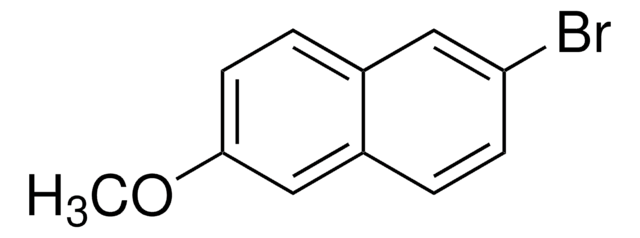235466
1-Vinylimidazole
≥99%
Synonym(s):
1-Ethenyl-1H-imidazole, 1-Ethenylimidazole, 1-Vinyl-1H-imidazole, N-Vinylimidazole
About This Item
Recommended Products
Assay
≥99%
form
liquid
refractive index
n20/D 1.533 (lit.)
bp
192-194 °C (lit.)
78-79 °C/13 mmHg (lit.)
density
1.039 g/mL at 25 °C (lit.)
SMILES string
C=Cn1ccnc1
InChI
1S/C5H6N2/c1-2-7-4-3-6-5-7/h2-5H,1H2
InChI key
OSSNTDFYBPYIEC-UHFFFAOYSA-N
Looking for similar products? Visit Product Comparison Guide
Application
- as functional monomer in the synthesis of molecularly imprinted polymers
- as monomer in the preparation of magnetic-poly(divinylbenzene-1-vinylimidazole) [m-poly(DVB-VIM)] microbeads
- in the synthesis of novel ion imprinted polyvinylimidazole-silica hybrid copolymer (IIHC)
- in removal of the vinyl protecting group via isoprene-catalyzed lithiation process
Signal Word
Danger
Hazard Statements
Precautionary Statements
Hazard Classifications
Acute Tox. 4 Oral - Eye Dam. 1 - Repr. 1B
Storage Class Code
6.1C - Combustible acute toxic Cat.3 / toxic compounds or compounds which causing chronic effects
WGK
WGK 2
Flash Point(F)
183.2 °F - Pensky-Martens closed cup
Flash Point(C)
84 °C - Pensky-Martens closed cup
Personal Protective Equipment
Certificates of Analysis (COA)
Search for Certificates of Analysis (COA) by entering the products Lot/Batch Number. Lot and Batch Numbers can be found on a product’s label following the words ‘Lot’ or ‘Batch’.
Already Own This Product?
Find documentation for the products that you have recently purchased in the Document Library.
Customers Also Viewed
Our team of scientists has experience in all areas of research including Life Science, Material Science, Chemical Synthesis, Chromatography, Analytical and many others.
Contact Technical Service











